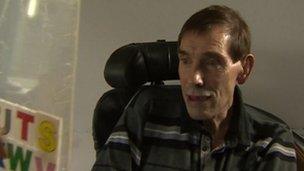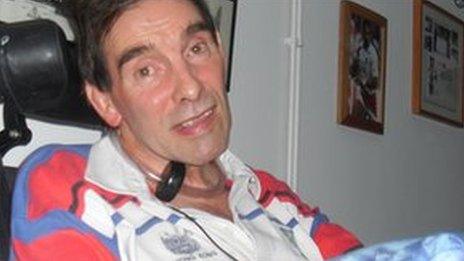Law on euthanasia challenged by Tony Nicklinson case
- Published
- comments

Tony Nicklinson communicates using a letter board, by blinking or nodding his head
The case of Tony Nicklinson represents a fundamental challenge to the current law on murder and euthanasia.
At present any doctor who deliberately gave a lethal dose - even if the intention was to relieve suffering - would face a murder charge.
In his judgement, Mr Justice Charles said the court was being invited to cross the Rubicon which runs between the care of the patient on one side and euthanasia on the other.
The Ministry of Justice argued that the Nicklinson case should be struck out and never have a full hearing because the law on murder was settled and it was for Parliament, not the courts, to change it. But the judge ruled that Tony Nicklinson had an arguable case which deserved a full hearing.
Judges can and do intervene in end of life decisions.
In 1993 the House of Lords ruled that Tony Bland, crushed in the Hillsborough disaster, should be allowed to die through the withdrawal of feeding tubes. He was in a persistent vegetative state after suffering severe brain damage and the judges said that it was in his best interests to be allowed to die.
In 2000 judges ruled that conjoined twins being treated at London's Great Ormond Street Hospital should be separated - against the wishes of their parents - in the full knowledge that one of them would die. In this case it was to give one of the twins a chance of life.
The courts have also forced prosecutors to clarify the law surrounding suicide. Debbie Purdy, who has multiple sclerosis, wanted to know if her husband would be prosecuted if he took her to a suicide organisation in Switzerland.
Jane Nicklinson said her husband's only way of committing suicide would be to refuse food and the family did not want to go to Switzerland - and this might not even be possible.
The case of Tony Nicklinson will prompt enormous sympathy. Before his stroke he led an active life, working in Dubai as an engineer. For more than six years he has needed constant care - an active mind locked inside a paralysed body.
But many will find the case unsettling. Dr Chris Farnham, a consultant in palliative medicine, said victory for Mr Nicklinson would have damaging implications:
"It would set a precedent that would fundamentally change the relationship between patients and doctors and create an expectation that we can deliver something that within the law we currently can't - namely to actively kill our patients."
Mr Justice Charles said Tony Nicklinson's case raises questions of great social ethical and religious significance, issues which will now be fully aired in court later this year.
- Published12 March 2012

- Published12 February 2011